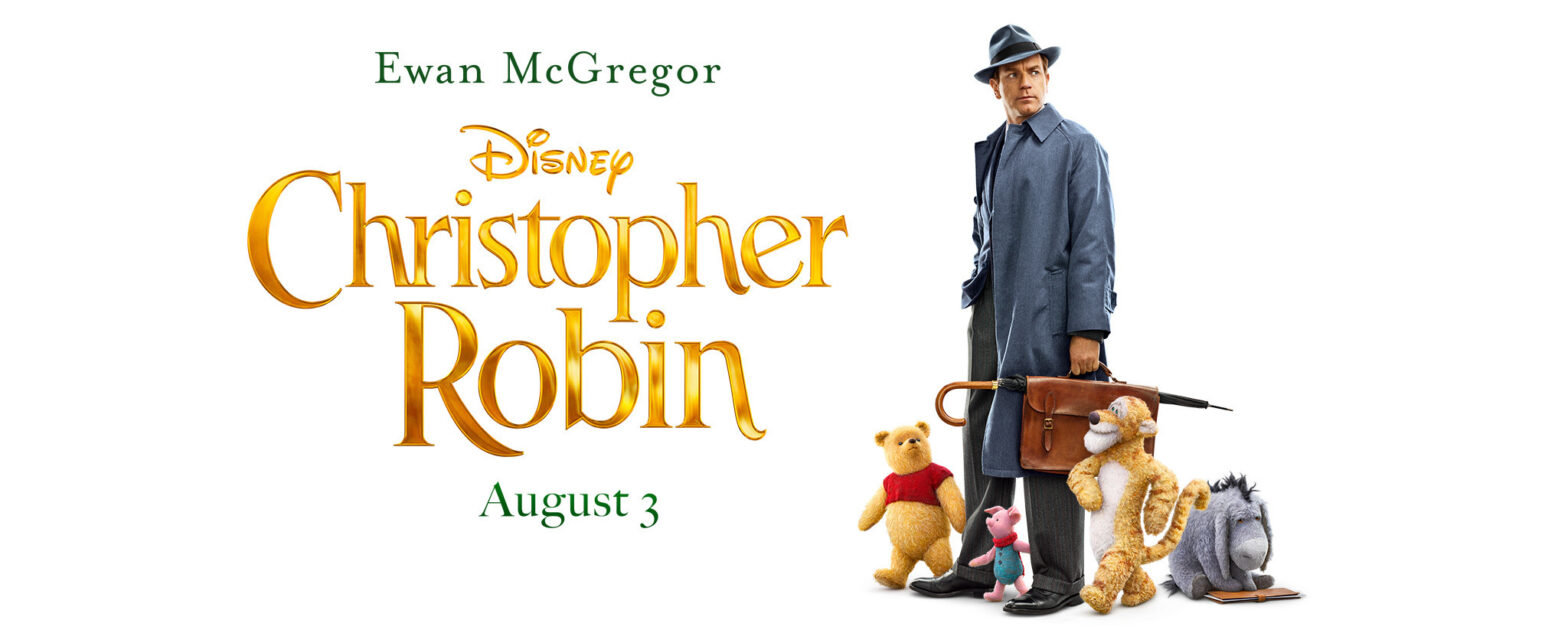Tonight after work I went to see Christopher Robin.
I went into the film with a deep misgiving, and I left the film with a deep misgiving, but the misgiving I had going in was not the misgiving I had coming out.
Christopher Robin, the character in the Pooh stories, was based on Christopher Robin Milne, the son of the writer A.A. Milne, and Christopher Robin Milne had a difficult relationship with his parents and an unease with his unwanted literary fame. Knowing that, I felt the film was starting from a problematic point; the premise of the film — Christopher Robin has an adventure with Pooh and friends as an adult — is rather contrary to the adult that Christopher Robin Milne was. But the film makes it clear, pretty much right from the start, that the film’s Christopher Robin isn’t Christopher Robin Milne in any meaningful way. He’s Christopher surname Robin, and it’s very strange to hear Pooh and friends say “Christopher” instead of “Christopher Robin” or adults, like his boss, refer to his by his last name, “Robin.” One can, with some squinting, imagine Christopher Robin, the film, as a sequel to the original Disney animated film, The Many Adventures of Winnie-the-Pooh. A.A. Milne’s books and the historical person of Christopher Robin Milne don’t factor into the film at all.
As I said, I left the film with a deep misgiving, and it’s a major one. I’m not at all sure who this film’s audience is intended to be. It’s not a kids film, despite the presence of Winnie-the-Pooh, and it’s not really an adult film.
Christopher Robin has a very strange tone. The first act is bleak, with Christopher Robin (as a child) abandoning Pooh and the Hundred Acre Wood because he’s going to boarding school, his father’s death while he’s at school, leaving a pregnant wife to go and fight in World War II, the intercut scene of his daughter’s third birthday (a daughter he’s never seen, by the way) and an attack on a German position where he’s (presumably) wounded because when next we see him he’s been invalided home. I have to be honest, I was actually crying during part of this. And when we jump ahead a few years, to the film’s main story, we see a man consumed with his work (which he seems to be good at, but it brings him no joy) at the expense of his relationships with his wife and daughter (now aged ten-ish). There’s Serious Drama Stuff happening here, and when Pooh enters the scene, there are moments of whimsy, but the film stays quite serious.
And then Christopher Robin tells Pooh to fuck off.
Ewan McGregor as Christopher Robin does not use those exact words, but that’s what happens. We’re forty minutes into the film, Christopher Robin and Pooh have traveled to Sussex so Pooh can return to the Hundred Acre Wood, Christopher Robin has gone in after Pooh, and there’s this very gloomy sequence of the two of them wandering around a foggy, muddy wasteland, and it climaxes with an exasperated Christopher Robin yelling at Pooh and Pooh going away.
At this point, the film lightens up slightly — Christopher Robin getting the gang back together, so to speak, was fun — but the film has carried so much emotional freight to this point that it doesn’t recover. Christopher Robin has a fight with his wife and his daughter, his daughter discovers things about her father’s childhood, and soon she’s off on an expotition to London with her father’s strange childhood friends while Christopher Robin works to prevent his department from being laid off by his bosses and Christopher Robin’s wife Evelyn panics about her daughter’s sudden disappearance. There are moments of charm, even humor, but these moments are surrounded by the Very Serious Drama.
it really felt to me like this film was made from two different scripts based on the same story outline, the first half coming largely from a Very Serious Drama draft, the second half coming largely from a Light Comedy draft, with the junction of the two coming where Christopher Robin hallucinates while drowning.
And I really expected some payoff to Christopher Robin’s neighbor who wanted desperately to play Gin Rummy.
I liked the actors, in particular Ewan McGregor and the actress who played his daughter, though Hayley Atwell is wasted in a horribly underwritten role. Pooh and Tigger sound the way you expect them to, but Piglet is “off,” and I miss Peter Cullen (the voice of Optimus Prime) as Eeyore. Peter Capaldi and Toby Jones are fun as Rabbit and Owl respectively, and Mark Gatiss brings the smarm as Christopher Robin’s boss.
Some parts of the film I liked. Some parts of the film I didn’t. I laughed at some parts. I sat stone faced at other parts. This film could have worked, but it’s too inconsistent in tone, and it doesn’t really know what kind of film it wants to be. Christopher Robin is too light to be a Very Serious Drama, and it’s too serious to be a Light Comedy about a man reconnecting with his childhood and realizing what’s important in life.
Christopher Robin looks good, and the non-human characters feel real, but it’s a narrative mess, an experiment that didn’t work, and this will always be the weakest of Disney’s Pooh movies.
